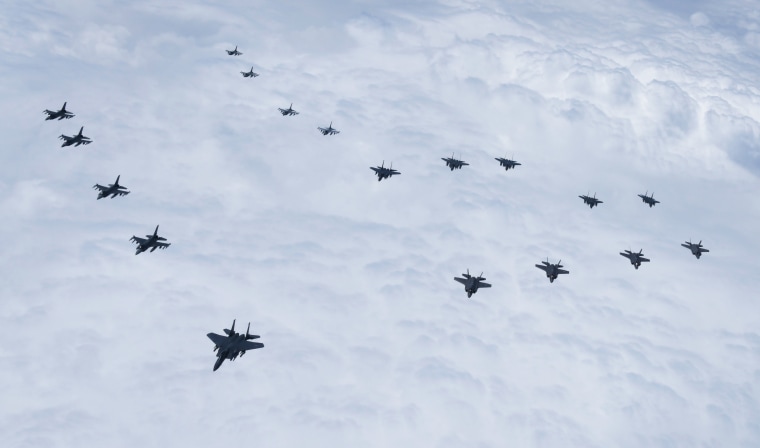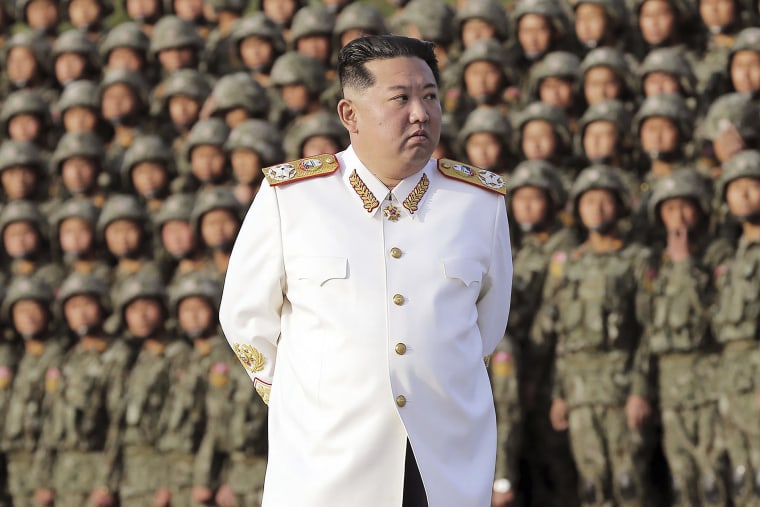The South Korean and U.S. militaries flew 20 fighter jets over waters off South Korea’s western coast Tuesday in a continued show of force as a senior U.S. official warned of a forceful response if North Korea goes ahead with its first nuclear test explosion in nearly five years.
South Korea’s Joint Chiefs of Staff said the air demonstration involved 16 South Korean planes — including F-35A stealth fighters — and four U.S. F-16 fighter jets and was aimed at demonstrating their ability to swiftly respond to North Korean provocations.
The flight came a day after the allies fired eight surface-to-surface missiles into South Korea’s eastern waters to match a weekend missile display by North Korea, which fired the same number of weapons from multiple locations Sunday in what was likely its biggest single-day testing event.
North Korea may soon up the ante as U.S. and South Korean officials say the country is all but ready to conduct another detonation at its nuclear testing ground in the northeastern town of Punggye-ri. Its last such test and sixth overall was in September 2017, when it claimed to have detonated a thermonuclear bomb designed for its intercontinental ballistic missiles.
Traveling to Seoul to discuss the standoff with South Korean and Japanese allies, Deputy Secretary of State Wendy Sherman warned of a “swift and forceful” response if the North carries out another nuclear test.

While the Biden administration has vowed to push for additional international sanctions if North Korea goes on with the nuclear test, the prospects for meaningful new punitive measures are unclear with the U.N. Security Council divided.
“Any nuclear test would be in complete violation of U.N. Security Council resolutions. There would be a swift and forceful response to such a test,” Sherman said, following a meeting with South Korea Vice Foreign Minister Cho Hyun-dong.
“We continue to urge Pyongyang to cease its destabilizing and provocative activities and choose the path of diplomacy,” she said.
Sherman and Cho are planning a trilateral meeting with Japanese Vice Foreign Minister Mori Takeo on Wednesday over the North Korean nuclear issue.
North Korea’s launches on Sunday extended a provocative streak in weapons tests this year that also included the country’s first demonstrations of ICBMs since 2017.
Since taking power in 2011, North Korean leader Kim Jong Un has accelerated his weapons development despite limited resources. Experts say with its next test, North Korea could claim an ability to build small bombs that could be clustered on a multiwarhead ICBM or fit on short-range missiles that could reach South Korea and Japan.
Rafael Mariano Grossi, director general of the International Atomic Energy Agency, said Monday there are indications that one of the passages at the Punggye-ri testing ground has been reopened, possibly in preparations for a nuclear test.

Hours before Sherman’s meeting in Seoul, State Department spokesperson Ned Price told reporters in Washington that the United States remains concerned that North Korea could seek its seventh test “in the coming days.”
The Biden administration’s punitive actions over North Korea’s weapons tests in recent months have been limited to largely symbolic unilateral sanctions. Russia and China vetoed a U.S.-sponsored resolution in the Security Council that would have imposed additional sanctions on North Korea over its previous ballistic tests on May 25.
“Unilateral actions are never going to be the most attractive or even the most effective response,” Price said.
Nuclear talks between Washington and Pyongyang have stalled since 2019 over disagreements in exchanging the release of crippling U.S.-led sanctions for the North’s disarmament steps. Kim has since ramped up his testing activity despite mounting economic problems and has shown no willingness to fully surrender an arsenal he sees as his strongest guarantee of survival.
His government has so far rejected the Biden administration’s offers for open-ended talks and is clearly intent on converting the dormant denuclearization negotiations into a mutual arms-reduction process, experts say.
Kim’s pressure campaign hasn’t been slowed by a Covid-19 outbreak spreading across his largely unvaccinated populace of 26 million amid a lack of public health tools. The North has so far rejected U.S. and South Korean offers for help, but there are indications that it received at least some supplies of vaccines from ally China.
South Korean activist Park Sang-hak, a North Korean defector who for years have launched anti-Pyongyang propaganda leaflets by balloon across the border, said his group on Tuesday flew 20 balloons carrying medicine, masks and vitamin pills to help North Korean civilians.